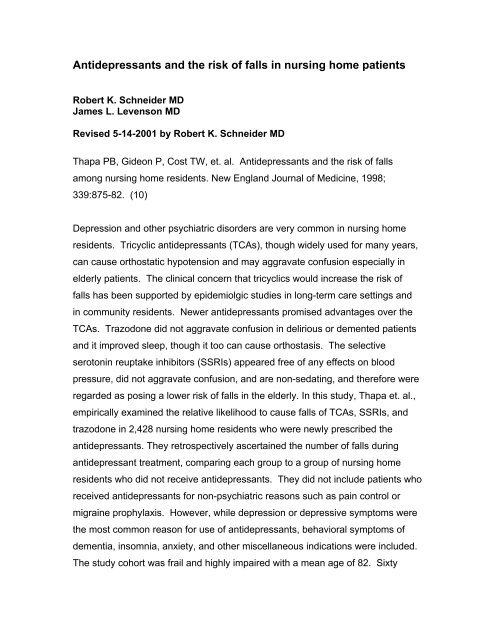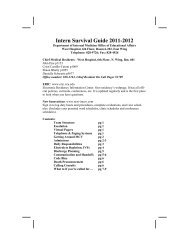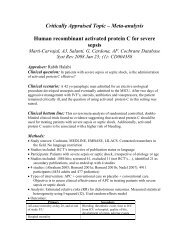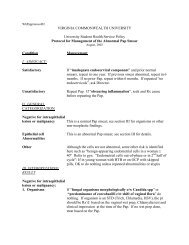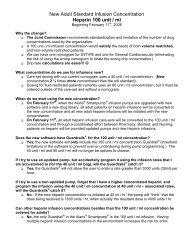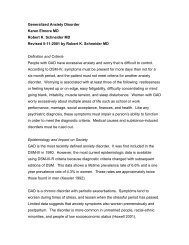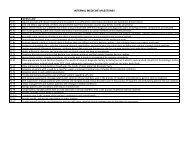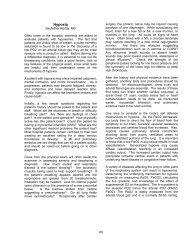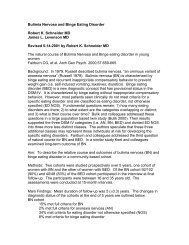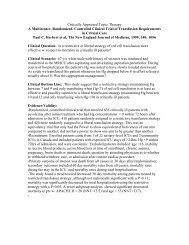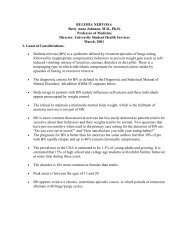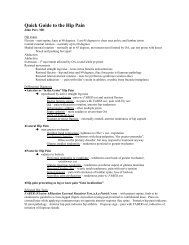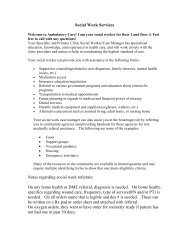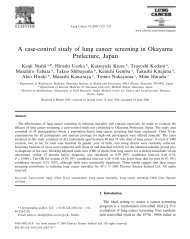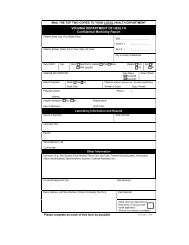POEM: Antidepressants and the risk of falls in nursing home patients
POEM: Antidepressants and the risk of falls in nursing home patients
POEM: Antidepressants and the risk of falls in nursing home patients
You also want an ePaper? Increase the reach of your titles
YUMPU automatically turns print PDFs into web optimized ePapers that Google loves.
<strong>Antidepressants</strong> <strong>and</strong> <strong>the</strong> <strong>risk</strong> <strong>of</strong> <strong>falls</strong> <strong>in</strong> nurs<strong>in</strong>g <strong>home</strong> <strong>patients</strong>Robert K. Schneider MDJames L. Levenson MDRevised 5-14-2001 by Robert K. Schneider MDThapa PB, Gideon P, Cost TW, et. al. <strong>Antidepressants</strong> <strong>and</strong> <strong>the</strong> <strong>risk</strong> <strong>of</strong> <strong>falls</strong>among nurs<strong>in</strong>g <strong>home</strong> residents. New Engl<strong>and</strong> Journal <strong>of</strong> Medic<strong>in</strong>e, 1998;339:875-82. (10)Depression <strong>and</strong> o<strong>the</strong>r psychiatric disorders are very common <strong>in</strong> nurs<strong>in</strong>g <strong>home</strong>residents. Tricyclic antidepressants (TCAs), though widely used for many years,can cause orthostatic hypotension <strong>and</strong> may aggravate confusion especially <strong>in</strong>elderly <strong>patients</strong>. The cl<strong>in</strong>ical concern that tricyclics would <strong>in</strong>crease <strong>the</strong> <strong>risk</strong> <strong>of</strong><strong>falls</strong> has been supported by epidemiolgic studies <strong>in</strong> long-term care sett<strong>in</strong>gs <strong>and</strong><strong>in</strong> community residents. Newer antidepressants promised advantages over <strong>the</strong>TCAs. Trazodone did not aggravate confusion <strong>in</strong> delirious or demented <strong>patients</strong><strong>and</strong> it improved sleep, though it too can cause orthostasis. The selectiveseroton<strong>in</strong> reuptake <strong>in</strong>hibitors (SSRIs) appeared free <strong>of</strong> any effects on bloodpressure, did not aggravate confusion, <strong>and</strong> are non-sedat<strong>in</strong>g, <strong>and</strong> <strong>the</strong>refore wereregarded as pos<strong>in</strong>g a lower <strong>risk</strong> <strong>of</strong> <strong>falls</strong> <strong>in</strong> <strong>the</strong> elderly. In this study, Thapa et. al.,empirically exam<strong>in</strong>ed <strong>the</strong> relative likelihood to cause <strong>falls</strong> <strong>of</strong> TCAs, SSRIs, <strong>and</strong>trazodone <strong>in</strong> 2,428 nurs<strong>in</strong>g <strong>home</strong> residents who were newly prescribed <strong>the</strong>antidepressants. They retrospectively ascerta<strong>in</strong>ed <strong>the</strong> number <strong>of</strong> <strong>falls</strong> dur<strong>in</strong>gantidepressant treatment, compar<strong>in</strong>g each group to a group <strong>of</strong> nurs<strong>in</strong>g <strong>home</strong>residents who did not receive antidepressants. They did not <strong>in</strong>clude <strong>patients</strong> whoreceived antidepressants for non-psychiatric reasons such as pa<strong>in</strong> control ormigra<strong>in</strong>e prophylaxis. However, while depression or depressive symptoms were<strong>the</strong> most common reason for use <strong>of</strong> antidepressants, behavioral symptoms <strong>of</strong>dementia, <strong>in</strong>somnia, anxiety, <strong>and</strong> o<strong>the</strong>r miscellaneous <strong>in</strong>dications were <strong>in</strong>cluded.The study cohort was frail <strong>and</strong> highly impaired with a mean age <strong>of</strong> 82. Sixty
percent used a wheelchair or were chair- or bed-bound, 35% were <strong>in</strong>cont<strong>in</strong>ent,22% had major cognitive impairment, <strong>and</strong> many also required physical restra<strong>in</strong>ts,benzodiazepenes or antipsychotic drugs.As expected, <strong>patients</strong> receiv<strong>in</strong>g TCAs had a higher rate <strong>of</strong> fall<strong>in</strong>g (adjusted rateratio 2.0, 95% confidence <strong>in</strong>terval 1.8-2.2) compared to non-users <strong>of</strong>antidepressants. Surpris<strong>in</strong>gly, SSRIs were associated with almost as high a rate<strong>of</strong> <strong>falls</strong> (1.8 CI, 1.6-2.0) compared to non-users. There was only a slight <strong>in</strong>crease<strong>in</strong> <strong>risk</strong> <strong>in</strong> those who received trazodone (1.2, CI 1.0-1.4). Increas<strong>in</strong>g doses <strong>of</strong>TCA or SSRI antidepressants were associated with higher rates <strong>of</strong> <strong>falls</strong>. Patientswho received antidepressants to control behavioral symptoms <strong>of</strong> dementia hadmore <strong>falls</strong> than those receiv<strong>in</strong>g <strong>the</strong> drugs for depression. The <strong>risk</strong> <strong>of</strong> <strong>falls</strong> withTCAs, but not with SSRIs, significantly <strong>in</strong>creased <strong>in</strong> <strong>patients</strong> who were tak<strong>in</strong>gmultiple cardiovascular drugs.The major limitation <strong>of</strong> this study is that it is retrospective <strong>and</strong> non-r<strong>and</strong>omized;<strong>the</strong>re were substantial <strong>and</strong> important differences between <strong>the</strong> <strong>patients</strong> receiv<strong>in</strong>gTCAs, SSRIs, trazodone, or no antidepressant <strong>in</strong> multiple factors that <strong>the</strong>mselvescould be expected to affect <strong>the</strong> rate <strong>of</strong> <strong>falls</strong>. The <strong>in</strong>vestigators did statisticallyadjust for <strong>the</strong>se differences (e.g. major cognitive impairment, use <strong>of</strong>benzodiazepenes or antipsychotics, reason for start<strong>in</strong>g antidepressant, etc.), but<strong>the</strong> validity <strong>of</strong> <strong>the</strong> f<strong>in</strong>d<strong>in</strong>gs may be limited by <strong>the</strong> design, nonequivalence <strong>of</strong>groups, <strong>and</strong> heterogeneous diagnoses <strong>and</strong> <strong>in</strong>dications for antidepressants.The importance <strong>of</strong> this study is that it challenges <strong>the</strong> widely held belief that SSRIsare quite benign <strong>in</strong> frail elderly <strong>patients</strong> <strong>and</strong> much safer than <strong>the</strong> older butconsiderably less expensive TCAs. The association between SSRI’s <strong>and</strong> <strong>falls</strong>was unexpected. How might this be expla<strong>in</strong>ed? SSRI’s do not causeorthostasis, but <strong>the</strong>y do frequently cause dizz<strong>in</strong>ess. Their stimulat<strong>in</strong>g effects alsomay have <strong>in</strong>creased mobility, which <strong>in</strong> turn might be associated with a higher <strong>risk</strong><strong>of</strong> fall<strong>in</strong>g. Ano<strong>the</strong>r possibility is that <strong>the</strong> reasons for antidepressant prescription
(depression, behavioral problems <strong>in</strong> dementia) may <strong>the</strong>mselves <strong>in</strong>crease <strong>the</strong> <strong>risk</strong><strong>of</strong> <strong>falls</strong>. This study does not allow any conclusion about why <strong>the</strong> rate <strong>of</strong> <strong>falls</strong> was<strong>in</strong>creased. What is clear is that all nurs<strong>in</strong>g <strong>home</strong> residents, <strong>and</strong> perhaps elderly<strong>patients</strong> <strong>in</strong> general, receiv<strong>in</strong>g antidepressants should be considered at possible<strong>in</strong>creased <strong>risk</strong> for <strong>falls</strong>, <strong>and</strong> appropriate prevention <strong>in</strong>stituted. S<strong>in</strong>ce <strong>the</strong> <strong>risk</strong> for<strong>falls</strong> was dose-related, physicians should strive to use <strong>the</strong> lowest effectiveantidepressant dose, which <strong>in</strong> some cases will be less than <strong>the</strong> usual start<strong>in</strong>gdose (e.g. fluoxet<strong>in</strong>e 20mg.)


